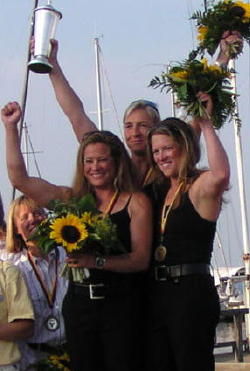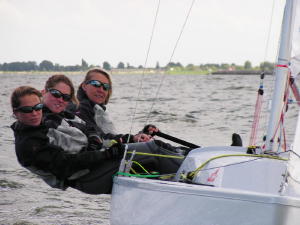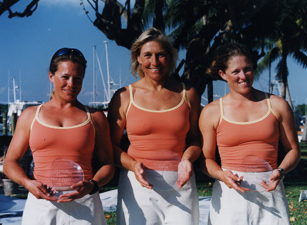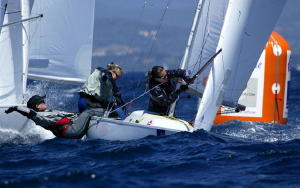Scuttlebutt Interviews:
 |
Betsy holds trophy up high with her 2003 Yngling World Champion team.
|
Betsy Alison
Fresh from their win at the Yngling Worlds, US Sailing Team women’s Olympic keelboat campaigners Betsy Alison, Lee Icyda and Suzy Leech have made a significant step toward their goal of representing the USA in the 2004 Olympic Games in Athens.
Here is Part One of a two part interview Betsy recently had with Scuttlebutt:
'Butt: This is the first Olympic cycle for the Yngling class. How has the class accepted becoming an Olympic class?
Betsy Alison: The Yngling class has always been very much a family-oriented class. I think that when you introduce the “Olympic element” to any class, it changes the dynamics a little bit. I think that in the Yngling class, the women that have jumped into the class are obviously maximizing the potential of the boat and raising the technical bar. Technologically, we are looking at things a little bit differently, we’re pushing limits and we’re trying to develop new equipment. There was a big hue and cry over introducing carbon spinnaker poles and carbon tillers. It certainly makes the boat better, but it introduces a higher level of cost to most of the sailors in the fleet.
Some people feel that in order to compete at the top right now they have to match what we’re doing. I think that poses a little bit of a problem for some of the stalwarts in the class. But then on the other hand, we’re bringing new things to the class and sharing them with the class, in hope that we can be a benefit to the class. There are some people that I think are resentful of the women being there, pushing so hard and raising the bar as high as we’ve done. I would hope that we’re welcome in the class and I hope we’re not doing anything to irritate people.
'Butt: This was the first Yngling Worlds won by a woman. Did this shake the earth or was it only a matter of time?
Betsy Alison: We were really happy as a team. The conditions we had, the light, choppy conditions, have never been an area of strength for our team. And we have been working really hard to improve our boat speed and our “zen-ness,” our calm in those conditions. So from that perspective we were thrilled. There were five world champions that were in that fleet and for us, it was a great feeling to know that we could be there with the best of the best that the Yngling class has shown in years past.
 |
Suzy, Lee and Betsy on their way to winning the 2003 Spa Regatta.
|
'Butt: What led to the formation of your team?
Betsy Alison: ISAF made one of the decisions for us when they imposed the weight limit on the class for the women. They established a weight limit of 205 kilos (451 pounds) for a crew of three. Most people would think than an average of 150 pounds per crew is very reasonable but when you look at what the weight of an average female athlete is, when you consider muscle weight and what not, I mean there are a lot of teams that are very close to the weight limit all the time. Not that it is a bad thing to have to deal with but it certainly changes the physical make up of the team.
Also, regardless of how much keelboat experience I have had, I really wanted to be part of a team where everyone was really smart. Lee had just come fresh out of college sailing, was an All-American, had the ability to make quick decisions and bring a fresh prospective to sailboat racing. And Suzy, her ability to call the line is so accurate that it is totally her ballgame. Then with my long time experience of sailboat racing I bring another prospective to it. Plus, we had to make sure that our personalities meshed. We travel so much and live so closely together all the time that if we didn’t get along off the boat and we didn’t have a good time, it would be a miserable experience. And I got to say; I love the girls I am sailing with both on and off the water.
'Butt: We understand your team has a new member.
Betsy Alison: One of our greatest assets is our Norwegian coach. In April, we started working with a new coach, Espen Stokkeland, and he has been a great neutralizer for us. With Espen, we are really a team of four as opposed to a team of three now. Where Espen’s been great is that he has a strong knowledge based on the Yngling. He was on a crew that won the Yngling Worlds in ’90, he has ten years of Soling campaign experience and a bronze medal from Sydney, plus he was working as a navigator with the Victory challenge syndicate in Auckland so he knows the differences little things can make.
Espen has guided us down this path where he has had a lot of experience before, and experience is a great teacher. Particularly in the last four months, his outside influence has accelerated our learning process, kept us directed, focused and on track with where we need to go. We may have gotten to the same place without Espen, but not nearly as quickly. His influence and outside observations have kept us from being critical of each other. We’re being more constructive, and it’s really helped us grow as a team together.
'Butt: Talk to us about communication.
Betsy Alison: I think that the biggest challenge that any team faces going into one of these campaigns is being able to communicate well both on and off the water. Sometimes the on-water communication is far easier because it is all part of the game we play and the job we do out there. But it is as equally important off the water. We realized early on how critical it was to step up to the plate to clear the air because how you interact off the water is a big component in terms of how you function on the water. Being efficient at what you say, and being positive in how you say it is a key to success. I think we have done a good job of that.
'Butt: How has your team dealt with setbacks?
Betsy Alison: We always knew that at some point in our program, no matter how successful we were from the outset, that we would probably have to take a step back to move forward. For us this happened in April when Espen came onboard. The way we had been sailing was fast, but in April he came to France and he wanted us to try a different approach to trimming and setting up the boat. For us, it was a 180-degree turn from what we had been doing.
We practiced for a week ahead of time and then we went into the Hyeres regatta and our results were not great, finishing seventh. We wiped out in heavy breeze and we were struggling with a few things. We had to think too much about what we were doing trim-wise. But as we became more familiar with the new set-up and the new way we were trimming, we started going faster and faster, eventually moving well forward from where we had been. So, no matter how frightening it is to radically change something, if you give it a little time and see where it goes, it could be a new direction and a better path to go down. So we’re not afraid to try new things and test them, and if one doesn’t work, you just cross it off the list. The object is to leave fewer stones unturned than anybody else.
 |
Suzy, Betsy and Lee looking buff.
|
'Butt: Your team is looking pretty muscular. Is this just another aspect of the program where you are seeking an edge?
Betsy Alison: You got to look good to sail good. Really, due to the weight limit, we have to eat right all the time. We definitely train hard. For me, I have never in my entire life time, even when I was sailing Lasers, have had to hike as hard as I do all the time in this boat. I have to straight leg (hike) all the time because I am the biggest one on the boat. And I don’t envy the girls because they put on their chest harnesses and droop hike and they’re under water most of the time.
Everybody on the boat has to be strong, and everybody has to be able to get their job done. And the interesting thing is that the more physically fit we are, the smarter we are. The more efficient is our decision making process and the more efficient our body movements are in the boat. Plus, when we are tired and we know we’ve been training as hard as we do, we know everybody else is that much more tired than we are. It makes a huge difference. And it is easy to blow it off and at forty-three, I wonder if I’m crazy to be doing what I am doing. But it’s worth it.
back to top of part one
And now, Part Two of Scuttlebutt's interview with Betsy Alison:
'Butt: With all the events you are doing in Europe, how challenging are the overseas logistics?
Betsy Alison: People say, “What’s the worst part of campaigning?” And it is really the logistics and the problems that aren’t related to us in the boat. Home for us right now is on the road. We just got back from eight weeks in Europe. We’ve got three weeks back in the states, and then we’re back to Europe again. We feel very comfortable traveling abroad and I know there are a lot of other teams and individuals that don’t particularly care to be living in foreign countries and foreign environments, eating food and dealing with all those hassles. But it is just another problem to solve.
Because we have to drag a keelboat around with a trailer and trailer boxes and the whole nine yards it made most sense for us to buy a second car and ship it over to Europe. That way we knew that we would have our own vehicle to tow our own boat and not have to be reliant on anyone else. It is just nice to know that you have that one element that you don’t have to think about.
When it comes to driving the boat around, none of us have a whole lot of time, but the more we get down this road, the more full-time the whole effort becomes and you have to make the effort to get every job done. Everything else seems to suffer a little bit (jobs, relationships, homesteads), but you realize it is only for a certain period of time, and it's maybe a once in a lifetime opportunity. Why wouldn’t you give it everything you’ve got? I don’t think you can do this half way to be successful at it.
'Butt: So what is your remaining schedule leading into the Olympic trials?
Betsy Alison: The way we see it, there are only two events that we have left to win. One is the Olympic trials and the next one is the Olympic games. When you look at it that way, everything between now and then is just part of the journey to get us there. It is practice, fine-tuning what we know we have to do.
I am soon heading to Athens to work with the US Disabled sailing team prior to their world championships. From there I fly to Cadiz, Spain for the ISAF Worlds. Then, we come right back to do the Rolex International Keelboat Championship in Annapolis, MD. Two weeks later we’re doing Bermuda Gold Cup to keep our hand in the match-racing scene. Eventually there are regattas that come down to one-on-one match racing like the Spa Regatta did this year. There are times when it really comes down to you versus one other team so we like to keep our hand in that game just to make sure we’re still sharp on the moves, that we know how to play that side of the sport.
Later, we’ve got some of the European teams that are coming over this fall and winter. We’re pretty excited about that, but it means we need to move to Miami come mid December and find a place to live in the Coconut Grove/Key Biscayne area. The worst thing about that is it’s peak season, and unless you know someone who is willing to house you, or has a guesthouse or an apartment, those costs escalate tremendously.
'Butt: Financially, what has it taken to get you where you are right now?
Betsy Alison: So many people think that money is no object in these Olympic campaigns but frankly we are living from hand to mouth all the time. Because of the amount of time it takes to train, compete and travel, it is unfortunate that we have to do it on a shoestring budget. If we didn’t have to worry about things financially, my god, our job would be so much easier.
When you talk about credit cards, I have three maxed out right now and it scares the life out of me. But when push comes to shove, you look at it all and you wonder if it is worth it. Is the journey itself worth it? Of course it is. And when I look at our team, our goals are the same. And I know for a fact that there are campaigns right now that are struggling with that, and people that have had friendships for years are struggling with that right now because of the pressures of the campaign. For us, I think we are lucky because we all have similar goals and drives.
So, financially it is a struggle, trying to work at the same time so that the bank doesn’t take my house and the loan companies don’t take the cars back, etc. We’ve been financing what we’re doing with private tax-deductible contributions from family, friends, and others that are interested in what we’re doing. Those are the people that are a huge part of our program, that have stepped forward to help us on the financial side. We now have almost five hundred people on our email server list, which provide us the ability to share our experiences with people that may never have the opportunity to do what we’re doing. To make them feel that they are with us on each step of the journey.
 |
Setting up for the run at '03 Hyeres Regatta.
|
'Butt: This year you have “two world championships.” What is your approach going into the ISAF Worlds in September?
Betsy Alison: The event is going to be very interesting because only five teams plus the Greek home teams have gotten their qualifying spots for the Olympic games, so this Worlds will largely impact who will compete in the games. For us, it remains an opportunity to qualify for some US Olympic funding for the next calendar year. However, in the big scheme of things, we are going to go there to practice, to test some new technology that we want to try out, and to test our skills against the best the world has to offer. It is an opportunity to try and test and get better in conditions in a foreign environment that we’re not necessarily familiar with. Again, the big thing for us is the Olympic trials in February and everything else up to then is to focus on training.
'Butt: Here at Scuttlebutt, we love our sponsors. Do you have any love to share for your supporters?
Betsy Alison: Our work with North Sails One Design has been huge for us. We are the biggest fans of Abbott Boats, who took a big risk when they jumped into the Yngling class to build boats. I think that Billy Abbott is producing the best quality boats on the market right now. A lot of other people have now since gone that direction because we were fast of the box with his boat. Harken Yacht Equipment has also been really supportive. Not only have they helped us out on the equipment side of things, but it is so nice when Peter Harken and others on his team follow our progress and send off an email to congratulate us on our achievements. Frank Atkinson from Rigging Systems has done all the cordage onboard our boat, Layline has helped us out with foulweather gear and we use Kaenon sunglasses. All those products have made a huge difference in terms of making us comfortable enough to do the job that we need to do.
'Butt: We have noticed your snazzy team uniforms at award presentations. Any comments?
Betsy Alison: We think it’s really important for us to have a united team image. My girls, they definitely are little fashion plates. They like to look good, we all do. So I said to them, “ We can have any clothes you want as long as I look good in them too.” I have to give credit to Lee and Suzy and Lee’s aunt for picking out our team uniforms and keeping us dressed well. We want people to believe that we’re professional in what we do and in our approach to our program. Should we come across a company that wants to sponsor us through the Trials and the Games, then we want them to know that we are going to represent them as best we can with the right image. And I think we have that.
back to top of part two
|


